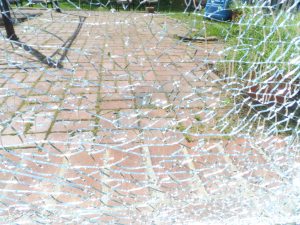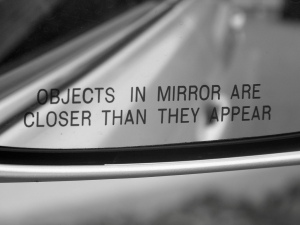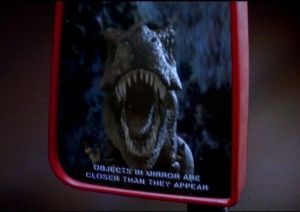I smashed my glass back door last week, a casualty of a drive-by pebble kicked up while weed whacking. It wasn’t a dramatic shattering, Batman careening through a skylight—just a tap, a ping, and then the fracture spread. I couldn’t see the ripples, but every time I looked it was wider and wider and more diffused, and I could hear it, tic-tic-tic-tic-tic, like the ominous soundtrack of children standing on thin ice. It took at least twenty-four hours for the tempered glass to completely web over.
I called the glass company with the best slogan: We Fix Your Panes. Yes. That is what I want. And I couldn’t help but think of all of the glass and mirror metaphors we live by, because we literally and figuratively see ourselves in our glass. (And our glasses, but that’s for another post.) People who live in glass houses should not throw stones, or maybe we just need to be more careful about rocks lying near lawn tools and windows.
Yet the resulting door looked, to me, deliberate, and beautiful. We take transparency for granted, imagining that glass lets our sight out and light in without calling any attention to itself, an invisible shield against the outside. We can be indoors but not see the door itself; instead, we think we see the world as it is. The cracks made me see the window rather than through it, bringing the difference between insides and outsides into sharp relief. Not just through the looking glass, but at looking the glass.
It has been over a week now and I’m still waiting for the replacement window to arrive, but I’m in no rush anyway. I find myself looking at and out the broken glass more than any of the others in the house. I’m glad that I can’t see right through it, and that, unlike the other three adjacent glass doors, it does not reflect back on me in the same way anymore. I prefer for mirrors to be mirrors and glass to be glass. And as any car’s side mirror will tell you, Objects in Mirror are Closer Than They Appear. It’s less a warning to drivers than a snippet of found poetry, an accidental koan. We rely on reflections to represent reality, when in reality they are only reflections.
I just finished creating and teaching a new class, a first-year general education Western Civilization class on the topic of Hell in literature. And images of, and in, mirrors were a recurring theme, including Sartre’s No Exit, where hell is not just, famously, “other people,” but also a gaudy hotel room strangely devoid of mirrors. The three trapped characters can see only each other, never themselves. As they did not reflect on their actions in life, so they are denied the same in death. They can only see one another and are controlled by each other’s powerful gazes.
Less famously but more elaborately, Gloria Naylor (who also wrote Women of Brewster Place) has a novel called Linden Hills, modeled on Dante’s Inferno (which we also read). Again, mirrors seem to follow characters everywhere, here as a way to force these still-living people (Linden Hills is a more of a hell-on-Earth allegory than a straightforward vision of punishment in the afterlife) to ponder what part of themselves—referred to as the mirror in their soul—they are willing to barter in exchange for greater material success.
The book holds on to the possibility that reflections can be truthful—“Mirror, mirror on the wall,” etc. But I don’t believe they ever can be. Teachers use the word “reflection” to describe a particular kind of writing assignment, one that asks for thought, retrospection, and maybe a little personal soul searching. Dracula does not appear in a mirror, presumably because he has no soul, but also because he is not capable of this kind of human reflection: rumination, remorse, regret for his centuries of crimes. He cannot do anything differently.
But we need to be mindful of the problems of reflection as well: they can be fragmented, like my door; unflattering, like in a bathroom, or too kind, like in a department store; like the car’s mirror, dangerously close, or not close enough. And even the best reflections are really reversals: not the way things are, but their opposite.
Narcissus was never in love with himself; he was in love with his reflection. In the end, the only person in the world that you can never see is yourself.
And now, I need to call the glass company again. It has been longer than 4-6 days, and I my panes are still not fixed.
Time: a ten minute rough draft yesterday and forty six minutes just now.
Hourman note: Thanks to the WordPress world and all my new Followers. I hope you like what you’re reading. It’s because of you that I’m feeling motivated to get back to writing the blog on a regular basis.
Jesse Kavadlo




You have a way of slowing me down long enough to think, er….reflect. Excellent, again.
I get hung up on words’ multiple meanings. Glad you’re reading, commenting, and enjoying what you see, weezmarie.